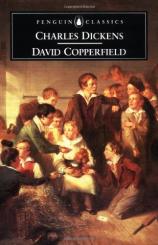Reading Group Guide
Discussion Questions
David Copperfield

1. In the final chapters of the novel, evil is punished (e.g. Heep's and Littimer's imprisonment) and virtue rewarded (e.g. the success of Micawber in Australia), prompting some critics to argue that Copperfield is less a novel of self-discovery than a traditional fairy tale. Do you agree? While it may be the last of Dickens's novels with a "happy ending," how would you characterize the prevailing mood of the book?
2. Although Peggotty assumes heroic stature in the novel, do you find anything obsessive, or even sinister, in his reclamation of Emily? Recalling Mr. Wickfield's confession that his fears of Agnes leaving him caused him to drink, compare his anxieties of his daughter's coming of age with Peggotty's.
3. In his recent biography of the author, Peter Ackroyd claimed that London was for Dickens "an emblem of forgetfulness." Copperfield, in its record of the perpetual destruction and rebuilding of London, would seem to indicate this but is there anything redeemable about the city as it is portrayed in the novel? What about urban life? What is London's relation to Yarmouth?
4. When musing on Steerforth, there are times the narrator reaches a state of rapture. When Steerforth's treachery is discovered, Copperfield admits "I never had loved Steerforth better than when the ties that bound me to him were broken." Does Copperfield ever resolve his feelings for Steerforth?
5. The critic Edmund Wilson claimed that all of Dickens's work revolved around the idea of the prison. How does the prison function as a metaphor in David Copperfield? Examine the role of the various key holders who possess or attempt to possess control of others—e.g. Mrs. Murdstone, Heep, Steerforth.
6. Uriah Heep's career, in some respects, parallels Copperfield's: they both come from impoverished backgrounds; they both establish legal professions; and they both aspire to marry their employer's daughter. How is Heep Copperfield's double? What does his, at times extreme, hatred of Heep reveal about Copperfield?
7. Blunderstone and Murdstone are two examples of names pregnant with meaning. Discuss the thematic significance of other names in the novel, especially those given to Copperfield throughout the book—Daisy, Trotwood, Doady. What do you make of the names that echo the author's own: Mr. Dick, King Charles I, and the initials (reversed) of Copperfield?
8. From the caul with which Copperfield is born (believed to protect one from drowning) to the shipwreck scene at the end, David Copperfield contains countless allusions to and images of the sea. How do these elements function in the novel? Do they indicate a deliberate use of symbolism? What might they symbolize?
9. The narrator relates several important dreams in the novel, particularly the dream he has after seeing Julius Caesar and the cannonading dream that prefigures the death of Steerforth. What do these dreams reveal about Copperfield's anxieties?
David Copperfield
- Publication Date: September 1, 1997
- Mass Market Paperback: 912 pages
- Publisher: Penguin Classics
- ISBN-10: 0140434941
- ISBN-13: 9780140434941







